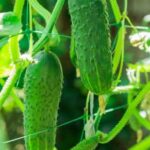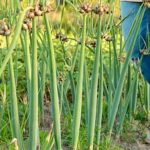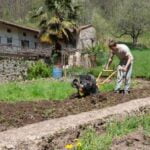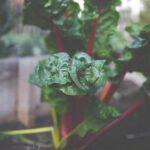Did you know that using rain barrel water for vegetable gardens can benefit both the environment and your wallet? Rain barrel water is collected from your roof and stored in a large container, providing an eco-friendly alternative to tap water for watering your garden.
Not only does it help conserve water, but it also reduces your water bill and provides essential nutrients for your plants. In this article, we will explore the various aspects of using rain barrel water for vegetable gardens, from setting up your rain barrel to proper watering techniques and maintaining your system.
Setting up a rain barrel is a simple and cost-effective way to collect rainwater for your vegetable garden. With step-by-step instructions, we will guide you through the process of setting up a rain barrel system, allowing you to harness nature’s gift of free, nutrient-rich water for your plants.
In addition to being environmentally friendly and cost-effective, using rain barrel water for vegetable gardens offers several benefits. We will discuss the advantages of using rain barrel water for watering vegetable gardens, including the nutrients found in rainwater that are beneficial for plant growth. Stay tuned as we also provide tips on how to use this natural resource safely and effectively in your garden.
Setting Up Your Rain Barrel
Setting up a rain barrel to collect water for your vegetable garden is a simple and cost-effective way to make a positive impact on the environment. By capturing and using rainwater, you can reduce water usage from traditional sources, such as municipal water supplies or wells, which can result in lower water bills.
Additionally, using rain barrel water for vegetable gardens reduces the demand on these traditional water sources and helps prevent stormwater runoff, which can carry pollutants into local waterways.
To set up your rain barrel system, you will need a few essential components. First, choose a suitable location for your rain barrel that is near a downspout from your home’s roof. This will allow you to capture as much rainfall as possible.
Ensure that the area is stable and level to support the weight of the full rain barrel. Next, install a diverter or connector kit on the downspout to direct rainwater into the barrel. Finally, position the rain barrel under the downspout and secure it in place.
Once your rain barrel is set up and collecting water, it’s essential to maintain it properly. Regularly check for debris such as leaves or insects that may accumulate at the top of the barrel, as they can contaminate the water if not removed.
It’s also important to cover your rain barrel with a fine mesh screen or lid to prevent mosquitoes from breeding in the standing water. By setting up and maintaining your rain barrel system correctly, you can ensure that the water collected is safe and clean for use in your vegetable garden.
| Benefits of Setting Up Your Rain Barrel | Data |
|---|---|
| Environmental Impact | Reduces demand on traditional water sources and prevents stormwater runoff |
| Cost Savings | Lowers water bills by reducing usage from municipal supplies or wells |
| Maintenance Tips | Regularly check for debris and cover with a mesh screen or lid |
Benefits of Using Rain Barrel Water for Vegetable Gardens
The benefits of using rain barrel water for vegetable gardens are numerous and significant. One of the primary advantages is that rainwater is naturally free of pollutants and chemicals, making it an ideal choice for watering edible plants. By using rain barrel water for your vegetable garden, you can avoid the use of treated city water or well water that may contain additives like chlorine or fluoride. This can lead to healthier, more natural produce.
In addition, rainwater contains essential nutrients that can benefit your vegetable garden. These nutrients include nitrogen, potassium, and other minerals that are naturally present in the atmosphere. When you use rain barrel water to irrigate your vegetables, you are providing them with these valuable nutrients, resulting in healthier and more robust plants.
Another significant advantage of using rain barrel water for vegetable gardens is the potential cost savings. By collecting and using rainwater instead of relying solely on municipal water sources, you can reduce your utility bills and minimize the environmental impact of excessive water consumption. Additionally, by utilizing a sustainable water source like rain barrel water, you contribute to conservation efforts and environmental sustainability.
| Advantages | Benefits |
|---|---|
| Natural source of water | Avoids pollutants and chemicals |
| Provides essential nutrients | Promotes healthier vegetables |
| Cost savings | Reduces utility bills and supports conservation efforts |
Choosing the Right Vegetables for Rain Barrel Water
When it comes to using rain barrel water for vegetable gardens, it’s important to consider which vegetables will thrive with this natural, nutrient-rich water source. While most vegetables can benefit from rain barrel water, there are certain ones that may do especially well with this type of irrigation.
Leafy greens such as lettuce, spinach, and kale are excellent choices for watering with rain barrel water. These vegetables tend to appreciate consistent moisture and are not as sensitive to the natural minerals found in rainwater. Additionally, herbs like basil, parsley, and cilantro can also flourish when watered with rain barrel water, as they generally prefer a slightly acidic pH level which is commonly found in rainfall.
On the other hand, some vegetables may need additional watering in addition to rain barrel water. For example, crops that produce large fruits such as tomatoes and peppers may require supplemental watering during periods of drought or intense heat. Root vegetables like carrots and radishes may also need extra attention during dry spells to ensure proper development.
It’s important to monitor the moisture needs of your vegetable garden and adjust your watering schedule accordingly when using rain barrel water. By selecting the right vegetables for rain barrel water and providing any necessary supplemental watering, you can make the most of this sustainable and eco-friendly irrigation method for your garden.
Tips for Using Rain Barrel Water Safely
When it comes to watering your vegetable garden, using rain barrel water can be a cost-effective and eco-friendly option. Rain barrel water is simply the water collected from rainfall, which is then stored in a container for later use. Not only does it help in reducing your water bill, but it also lessens the demand on municipal water supplies and reduces stormwater runoff.
One of the main concerns about using rain barrel water for vegetable gardens is its safety. Some may worry about contaminants or pollutants present in the rainwater that could potentially harm edible plants. However, with proper precautions and maintenance, rain barrel water can be safely used for watering your vegetables. It’s important to keep the rain barrel clean, ensure proper filtration systems are in place, and avoid using any chemicals or pesticides near the collection area.
To further ensure the safety of using rain barrel water for vegetable gardens, it’s recommended to follow proper watering techniques. For example, avoid directly spraying the harvested vegetables with rain barrel water; instead, focus on watering the soil around the plants to prevent potential contamination of the produce. Additionally, consider using a drip irrigation system or soaker hose when applying rain barrel water to minimize contact with edible parts of the plants.
In addition to its environmental benefits and potential cost savings, using rain barrel water for vegetable gardens provides an added bonus of beneficial nutrients. Rainwater is naturally soft and free from harsh chemicals commonly found in tap water. This makes it an excellent source of hydration for most vegetables.
However, keep in mind that certain vegetables may require additional watering due to their specific needs or higher moisture requirements. Nonetheless, incorporating rain barrel water into your gardening routine can have positive impacts not just on your wallet but also on your vegetable crops and the environment as a whole.
Proper Watering Techniques
When it comes to using rain barrel water for vegetable gardens, it’s important to ensure that you are watering your plants effectively to promote healthy growth and bountiful harvests. By following the proper watering techniques, you can make the most out of the rainwater you have collected and contribute to sustainable gardening practices.
Watering Frequency and Timing
One of the key aspects of using rain barrel water for vegetable gardens is understanding when and how often to water your plants. It’s essential to monitor the weather conditions and adjust your watering schedule accordingly.
Typically, vegetable gardens require about 1-1.5 inches of water per week, including rainfall. Using a rain gauge can help you keep track of how much water your garden is receiving from natural sources, allowing you to supplement with rain barrel water as needed.
Watering Method
When using rain barrel water for vegetable gardens, it’s best to apply the water directly to the soil around the base of each plant. This helps prevent moisture-related diseases and encourages deep root growth. Consider using a soaker hose or drip irrigation system, which allows for slow and steady watering while minimizing evaporation. Avoid overhead watering whenever possible, as this can lead to wasted water and increased risk of fungal diseases on leaves.
Monitoring Soil Moisture
To ensure that your vegetable garden is receiving adequate moisture from rain barrel water, regularly check the soil moisture levels. Use a trowel or soil moisture meter to dig into the soil and assess how deeply the moisture has penetrated. Aim for consistently moist soil throughout the root zone of your vegetables, making adjustments to your watering schedule as needed based on the condition of the soil.
By employing these proper watering techniques, you can maximize the benefits of using rain barrel water for your vegetable garden while promoting healthy plant growth and reducing overall water consumption.
Maintaining Your Rain Barrel System
Once you have set up your rain barrel system and started using rainwater for your vegetable garden, it’s important to maintain the system to ensure the water remains clean and safe for use. Here are some tips for maintaining your rain barrel system:
1. Regular Cleaning: It’s essential to clean your rain barrel at least once a year to remove any sediment, debris, or algae that may have accumulated. Use a non-toxic cleaner and a brush to scrub the inside of the barrel, then rinse it thoroughly before reconnecting it to the downspout.
2. Check for Leaks: Inspect your rain barrel regularly for any leaks or cracks that may develop over time. Repair any issues promptly to prevent water loss and keep the system functioning properly.
3. Secure the Lid: Make sure the lid of your rain barrel is securely fastened at all times to prevent debris, insects, or animals from getting into the water. This will help maintain water quality and minimize any potential contamination.
4. Winterizing: If you live in an area with freezing temperatures, it’s important to winterize your rain barrel to prevent damage. Drain the barrel completely before temperatures drop to avoid expansion and cracking, and disconnect the system from the downspout until spring.
By following these maintenance tips, you can ensure that your rain barrel system continues providing clean, nutrient-rich water for your vegetable garden throughout the year.
Remember that using rain barrel water for vegetable gardens is not only an eco-friendly way to conserve water but also offers numerous benefits for your plants’ health and growth. With proper maintenance and care, you can enjoy the advantages of using this natural resource while contributing positively towards sustainability efforts in gardening practices.
Other Uses for Rain Barrel Water
Composting
Rain barrel water can also be used to supplement your compost pile. The natural nutrients found in rainwater can enhance the composting process, making it more effective. Simply pour some rain barrel water over your compost pile to keep it moist and promote decomposition. This will result in nutrient-rich compost that can be added to your vegetable garden, creating a sustainable cycle of growth.
Garden Tool Maintenance
Another practical use for rain barrel water is for cleaning and maintaining garden tools. Instead of wasting potable water from the hose, use rain barrel water to rinse off dirt and debris from shovels, trowels, and other gardening equipment. This not only conserves water but also prevents harmful chemicals from entering the soil when cleaning tools with tap water.
Outdoor Cleaning
In addition to gardening tasks, rain barrel water can be utilized for general outdoor cleaning purposes. Use it to wash off patio furniture, clean the exterior of your house or rinse off outdoor toys. By using rainwater for these tasks, you are reducing your reliance on treated water while also minimizing runoff that carries pollutants into natural bodies of water.
Considering these alternative uses for rain barrel water showcases the versatility of this eco-friendly resource. Not only does collecting rainwater benefit your vegetable garden, but it also promotes sustainability throughout various aspects of your gardening routine.
Conclusion and Call to Action
In conclusion, using rain barrel water for vegetable gardens offers numerous benefits for both the environment and gardeners. By collecting and using rainwater, individuals can reduce their water costs and lessen the demand on municipal water supplies. Additionally, rain barrel water contains natural nutrients that can benefit the health and growth of vegetables, making it an ideal choice for watering edible plants.
As more people become conscious of sustainability and eco-friendly practices, utilizing rain barrel water for vegetable gardens can make a significant impact. It not only conserves water but also reduces runoff and pollution from stormwater. With proper setup and maintenance, rain barrels can be a valuable resource for nurturing thriving vegetable gardens while promoting environmental stewardship.
I encourage readers to consider implementing a rain barrel system in their own homes to take advantage of the many benefits it offers for gardening and sustainability. Whether you are an experienced gardener or just starting out, using rain barrel water for vegetable gardens is a simple yet impactful step towards a more sustainable and environmentally-friendly approach to gardening.
By incorporating this practice into your gardening routine, you can contribute to conservation efforts while reaping the rewards of healthier and thriving vegetable plants.
Frequently Asked Questions
Is It Safe to Use Rain Barrel Water on Vegetable Garden?
It is generally safe to use rain barrel water on a vegetable garden, as long as the water is not contaminated and the vegetables are rinsed before consumption. However, caution should be exercised to avoid potential risks.
Is Rain Water Better for Vegetable Garden?
Rain water can be beneficial for a vegetable garden because it is free of chemicals, soft, and slightly acidic. It can help to nourish plants and improve soil health without the added chemicals found in tap water.
How Do You Sanitize Rain Barrel Water?
To sanitize rain barrel water, several methods can be used including adding a small amount of bleach to kill bacteria, using a UV sterilizer, or installing a first flush diverter to remove debris and contaminants before the water enters the barrel. Regular maintenance is important to ensure the water remains clean for use in the garden.

If you’re looking to get into vegetable gardening, or are just looking for some tips on how to make your current garden better, then you’ve come to the right place! My name is Ethel and I have been gardening for years. In this blog, I’m going to share with you some of my best tips on how to create a successful vegetable garden.





